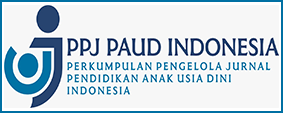The Influence of Parental Attachment on the Independence of 5-6 Years Old Children
(1) Universitas Sultan Ageng Tirtayasa
(2) Universitas Sultan Ageng Tirtayasa
(3) Universitas Sultan Ageng Tirtayasa
(*) Corresponding Author
DOI: https://doi.org/10.26858/tematik.v9i1.46487
Abstract
This research is motivated by the problem of low child independence. The purpose of this study was to determine the effect of attachment on the independence of children aged 5-6 years. Using a quantitative research approach with the ex-post facto method. The population used in this study were 176 children aged 5-6 years in RA throughout the District of Jombang - Cilegon, Banten. Sampling using the slovin formula as many as 63 children. Data collection techniques using questionnaires, with data analysis techniques to test the hypothesis t. Based on the findings regarding attachment to the independence of children aged 5-6 years that there are children who have high independence, the attachment of parents is high and vice versa. Children's independence is seen in children's behavior while in the school environment and outside of school. The results of attachment research on the independence of children aged 5-6 years show a significant value of 0.034 <0.05, so it can be interpreted that there is a significant influence between attachments on the independence of children aged 5-6 years.
Keywords
Full Text:
PDFReferences
Akmalia, I., & Rahayuningsih, S. I. (2018). Attachment (kelekatan) Ibu dan Anak dengan Perkembangan Sosial Emosional Bayi. JIM FKEP, III(3), 365–370.
Amini, M. (n.d.). Perkembangan dan Konsep Dasar Pengembangan Anak Usia Dini. UT Repository.
Andiprastowo. (n.d.). Sumber belajar & pusat sumber belajar: Teori dan aplikasinya disekolah / madrasah Tahun 2018.
Asih, S., & Susanto, A. (2017). Peningkatan Kecerdasan Naturalis Pada Anak Usia 5-6 Tahun Melalui Model Pembelajaran di Sentra Bahan Alam. Yaa Bunayya, 1(1), 33–38.
Cengceng. (n.d.). Prilaku Kelekatan pada Anak Usia Dini (Perspektif John Bowlby. Lentera, IXX(2), 141–153. https://journal.uinsi.ac.id/index.php/lentera_journal/article/view/437.
Daviq, C. (2019). PAUD Lectura: Jurnal Pendidikan Anak Usia Dini, Vol 3, No 1, Oktober 2019. Paud Lectura, 3(2), 1–9. https://doi.org/https://doi.org/10.31849/paud-lectura.v3i01.3351
Eka, S., & Munda, S. (2019). Kemandirian Anak Usia 5-6 Tahun. Buah Hati, 55(4), 524–530. https://doi.org/10.1134/s0514749219040037
Fitrianti, & Eliza, D. (2019). Peningkatan Karakter Moral Anak Usia 5-6 Tahun Melalui Cerita Nabi Ibrahim di Taman Kanak-Kanak Harapan Ibu Kabupaten Pasaman Barat. Inovation Tecnology Education, 1(2), 1–7.
Innamorati, S., Zannetti, M., & Zuanni, F. (2023). Sets of type (q- 1 , n) in PG(3, q). Ricerche Di Matematica, 9(June), 72–81. https://doi.org/10.1007/s11587-023-00779-9
Jamil, Z. A., Kuswardani, M. E., & Hidayat. (2020). Kelekatan Anak terhadap Orang Tua dalam Pembentukan Kemandirian di Taman Kanak-Kanak As-Salam Kota Jambi. GENERASI EMAS: Jurnal Pendidikan Islam Anak Usia Dini, 3(2), 107–120.
Martinis, Y., & Jamilah, S. S. (2010). Panduan Pendidikan Anak Usia Dini. Gunung Persada Press Group.
Novianti, R. (2021). Dasar-dasar Pendidikan Anak Usia Dini (R. Astuti (ed.)). EDU Publisher.
Perpétuo, C., El-Sheikh, M., Diniz, E., & Veríssimo, M. (2023). Attachment to Mother and Father, Sleep, and Well-Being in Late Middle Childhood. International Journal of Environmental Research and Public Health, 20(4). https://doi.org/10.3390/ijerph20043399
Rahman, U. (2009). Karakteristik Perkembangan Anak Usia Dini. Lentera Pendidikan : Jurnal Ilmu Tarbiyah Dan Keguruan, 12(1), 46–57. https://doi.org/10.24252/lp.2009v12n1a4
Sari, I. L., Asmawati, L., & Rosidah, L. (2020). Hubungan Kelekatan Orangtua Dengan Kepercayaan Diri Anak Usia 4-5 Tahun di TK Se-Kecamatan Sindang Jaya Kabupaten Tangerang-Banten. JPP PAUD FKIP Untirta, 7(1), 23–34.
Satriani. (2021). Asuhan Kebidanan Pasca Persalinan dan Menyusui (Y. Umaya (ed.); 1st ed.). Ahmedia Press.
Setiawati, E., & Mundasari. (2019). Kemandirian Anak Usia 5-6 Tahun. Buah Hati, 6(1), 46–52.
Silranti, M., & Yaswinda. (2019). Pengembangan Kemandirian Anak Usia 5-6 Tahun Di TK Dharmawanita Tunas Harapan. Jurnal Pendidikan Dan Pelajaran Anak Usia Dini, 6(2), 77–83.
Susanti, D. A. (2020). Bimbingan orang tua dalam mengembangkan perilaku kemandirian anak usia dini. 8(1), 35–56.
Suyanto, S. (2005). Dasar-Dasar Pendidikan Anak Usia. Hikayat Publishing.
Talty, A., Speyer, L. G., Eisner, M. P., Ribeaud, D., Murray, A. L., & Obsuth, I. (2022). The role of student-teacher relationships in the association between adverse parenting and emotion dynamics– combining longitudinal and ecological momentary assessment data. June, 1–27. https://doi.org/10.1111/jora.12874
W.E.N., A. (2020). Indahnya Pengasuhan dengan Thereplay. Bentang.
Yus, A. (2014). Model Pendidikan Anak Usia Dini (Jeffry (ed.); ke-3). Prenadamedia Group.
Article Metrics
Abstract view : 159 times | PDF view : 25 timesRefbacks
- There are currently no refbacks.
Copyright (c) 2023 Syifa Liwahul Rochmah; Kristiana Maryani; Fahmi

This work is licensed under a Creative Commons Attribution-NonCommercial 4.0 International License.
Published by:
Program Studi Pendidikan Guru Pendidikan Anak Usia Dini, Fakultas Ilmu Pendidikan, Universitas Negeri Makassar
Kerjasama:
Support by:
Email: [email protected]
p-ISSN: 2476 - 9363
e-ISSN: 2723 - 7613

TEMATIK: Jurnal Pemikiran dan Penelitian Pendidikan Anak Usia Dini is licensed under a Creative Commons Attribution-NonCommercial 4.0 International License.
View My Stats


























